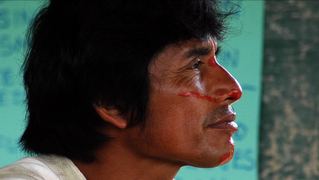
By Amy Goodman with Denis Moynihan
Lima, the capital of Peru, has become a city of gustatory renown, attracting foodies from the world over to sample dishes from its famous ceviche to favorites from the Andean highlands. So it is an appropriate place, perhaps, for what has become a genuine movable feast, the world-roving series of summits organized by the United Nations to tackle the crisis of climate change. This year’s meeting, known as “COP 20,” the 20th Conference of Parties to the Kyoto Protocol, is the last high-level meeting with presidents and prime ministers before the December 2015 climate summit in Paris.
The Paris meeting is supposed to produce an extension of the Kyoto Protocol, a new, global, legally binding treaty that restricts global warming to an increase in average global temperatures to just 2 degrees Celsius (3.6 degrees Fahrenheit). As such, all eyes are on Paris. But if the devil is in the details, it is here in Lima that the details are being worked out. You can’t spell “climate” without L-I-M-A.
First, it’s necessary to understand the setting, and who is at the table and who is not. Inside, the summit proceeds in an orderly manner, with U.N. police standing watch and a rarified air of diplomatic decorum. It is hard to feel any sense of urgency. This is astounding, as the science is clear: The world is warming rapidly, and without action, catastrophic climate change will soon become irreversible.
The official COP 20 is being held on the grounds of the Peruvian army headquarters—ominously named “El Pentagonito,” or “the little Pentagon.” In this militarized zone, the U.N. climate summit occurs in a Potemkin village, with formal ceremonies and intermittent, preapproved protests.
The imagery is not lost on many Peruvians organizing for climate justice. Wilfredo Saavedra Marreros, president of the Environmental Defense Front of Cajamarca, told “Democracy Now!”: “It’s a farce. … The representatives of the states of the world are meeting in a place that is stained with blood. In the Pentagonito, that military base, they have extrajudicially executed our brothers, they have burned them, they have disappeared them.”
Outside, in the bustling city streets of Lima, a city of more than 8 million people with interminable traffic jams, grass-roots activists are hosting their own “cumbre de los pueblos,” a people’s summit on climate change, in a public park across town. On Dec. 10, Human Rights Day, thousands of people marched through the streets, demanding genuine action on climate change.
Pascoe Sabido, with the group Corporate Europe Observatory (CEO), is organizing both inside and outside the COP 20. Together with other groups he released a report titled “Corporate Conquistadors: The Many Ways Multinationals Both Drive and Profit From Climate Destruction.” At one action inside, Sabido and others descended on a meeting sponsored by oil giants Shell, Chevron and other fossil-fuel interests. “There were lots and lots of very angry and active people there trying to protest against the presence of the fossil-fuel industry here in these talks,” he later told me. “Twenty years we’ve been going without progress towards a fair, ambitious climate deal that we need. One of the big reasons is because of the aggressive lobbying of the fossil-fuel industry, both at the national level and here in the talks.”
Another organizer at COP 20 is the Nigerian environmental leader Nnimmo Bassey. He said: “Before I left Nigeria, my temperature was gauged twice, to determine if I have high fever or if I have Ebola. Now, the temperature of the Earth has gone 0.8 degrees above preindustrial levels. If the Earth was to go through the same process … it would’ve been quarantined because the Earth would’ve been judged to have high fever or Ebola. But, we can’t quarantine the Earth. We need to find who are the climate criminals and quarantine them.”
It’s also important to note who isn’t here at COP 20. Yeb Sano was the lead climate negotiator for the Philippines last year. To the shock of many, he was pulled from the delegation this year and is home, as his nation is devastated by Typhoon Hagupit. Sano tweeted: “They can silence my mouth. But they cannot silence my soul.” Sano made waves at COP 19 in Warsaw, Poland. The Philippines was being hit then by Typhoon Haiyan. Sano wasn’t sure if his family had survived. In an emotional address to the summit, he said: “If not us, then who? If not now, then when? If not here, then where?” Many climate activists from the Philippines think concerted pressure from the U.S. and European governments prompted Sano’s removal, as he was becoming a forceful proponent of climate justice for the Global South.
Atossa Soltani, founder of the nonprofit organization Amazon Watch, told me that, despite all the COP’s deficiencies, she’s glad this global gathering is here in Peru, where more than 60 percent of the country—an area the size of Texas—is rain forest. “It’s the first COP ever in an Amazon country. And the Amazon is incredibly important in the climate debate. … It’s the heart of the planet, pumping moisture and vapor,” Soltani said. “That’s why this COP is important-to put the Amazon on the map, to put indigenous rights central to the debate, and to call for the end of the fossil-fuel era. That’s why we’re here.”
_ Goodman is the host of “Democracy Now!,” a daily international TV/radio news hour airing on more than 1,200 stations in North America. She is the co-author of “The Silenced Majority,” a New York Times best-seller._
© 2014 Amy Goodman / Distributed by King Features Syndicate
Click here to share and listen to to Amy Goodman’s weekly podcast. Subscribe to her podcast on SoundCloud and Stitcher Radio.










Media Options